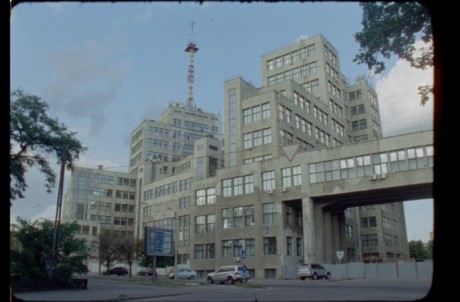


Tatjana Kononenko & Matilda Mester: Budynok

English title: The Building – Excellent film. A work on constructivism that is superbly constructed… Soviet history. Architecture. With lovely portraits of and episodes with Ukrainians of today, who work in The Building in Kharkiv that was meant to the symbol of communism. To give you a good background here is the description from the DocuDays festival (April 24 – May 3), where it will be part of the now online festival:
“In the east of Ukraine lies Derzhprom, the House of State Industry. Built between 1925 and 1928, it was intended to embody the idea of Communism. Although it was a poster child for the avant-garde movement, now it seems almost forgotten. Derzhprom acts as a kind of time machine. Space becomes time here. The Building moves between classic, observational documentary and experimental cinema. With very little dialogue, it is rather a poem of moving images. Through the use of mixed materials, including archive films from the 1920s, it reflects on how past and present, movement and time are related to the static nature of architecture.”
Information and interpretation. Step by step the viewer is being informed about the enormous and at that time innovative and impressive piece of constructivist architecture that was and is Derzhprom. With its artistic and ideological place in history. A couple of texts – there are many and they come, as I sense it, at the right time and at the right place : « It is time for art to organise itself and become part of Life… » and « constructivism is intellectual production (and not simply thinking)… ». You associate to Tatlin and Rodchenko and El Lissitsky, avantgardists, who wanted to create a post-revolutionary art – but who failed when Stalin’s socialist realism took over in the 1930’es. As did Malevich and Kandinsky.
The film has long sequences that make us take a fascinated look at The Building. Interesting camera angles on the steel and concrete, the symmetry, a subtle sound score accompanying the montage, again and again making space for archive material from when it was built in only three years, to be the centre in the big city surrounded by parks and big squares – and the obligatory statue of Lenin.
And inside The Building. Through several Entrances. Through several revolving doors. To the many lovely ladies who take care of those working in the offices and of the visitors. Who are working to lead the elevators to 5th, 6th or 7th floor. The filmmakers make us come close to them, to go up in the building with them. Faces, shy are many of them to be filmed, but there are also those who welcome the female directors (and a male sound engineer), give them an icecream and a chair to sit on – or give the crew a tour in the building at night. A beautiful sequence of faces filmed with a Bolex 16mm… and so on so forth. Interpretation – people walking in the streets around The Building, relaxing, reading a poem, smoking a cigarette, a man playing Internationale on a trumpet, noone around listening, archive: „Long Live the World Revolution“! Life of today and yesterday. Excellent.
Germany, Ukraine, 2019, 93 mins.